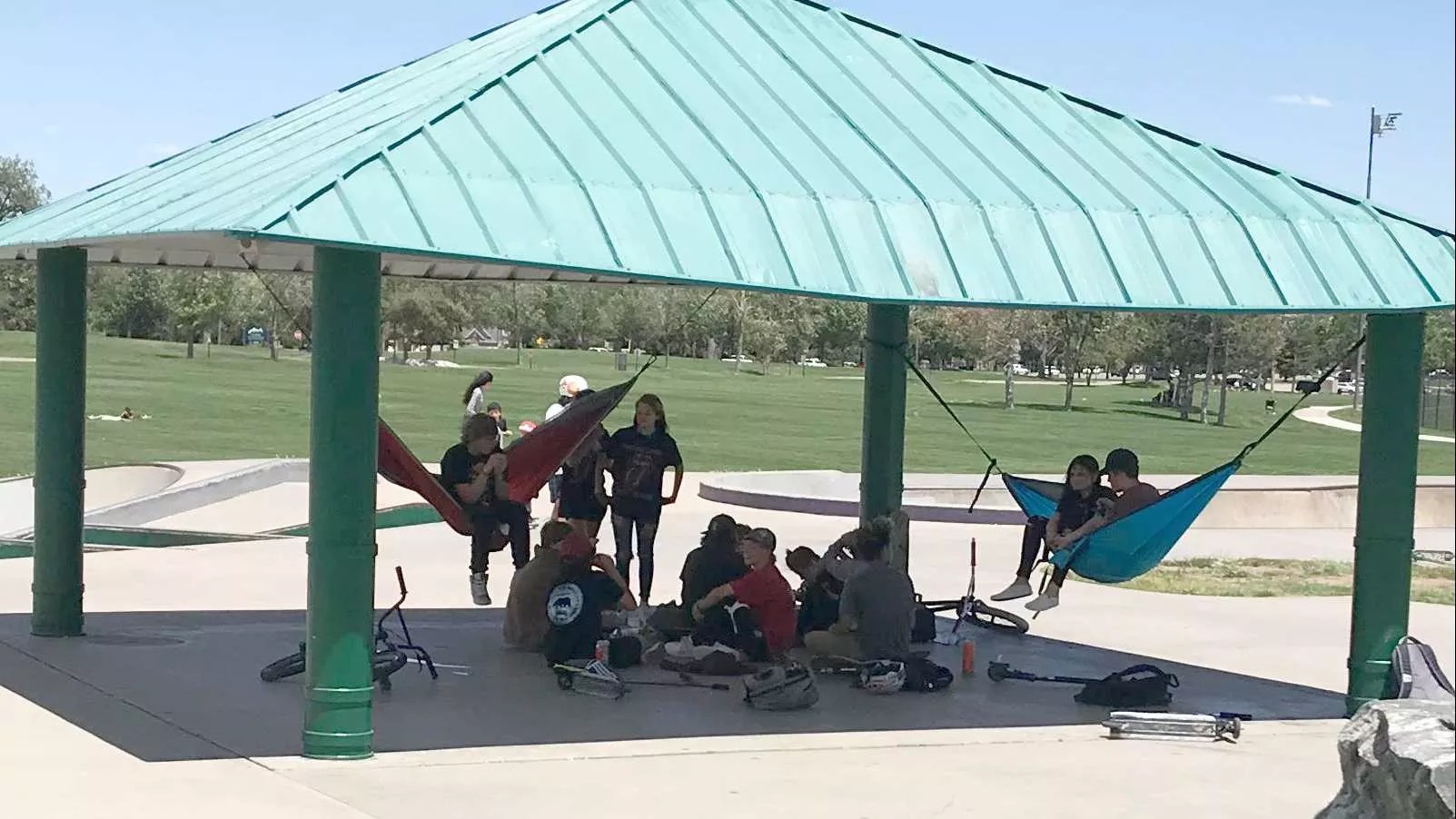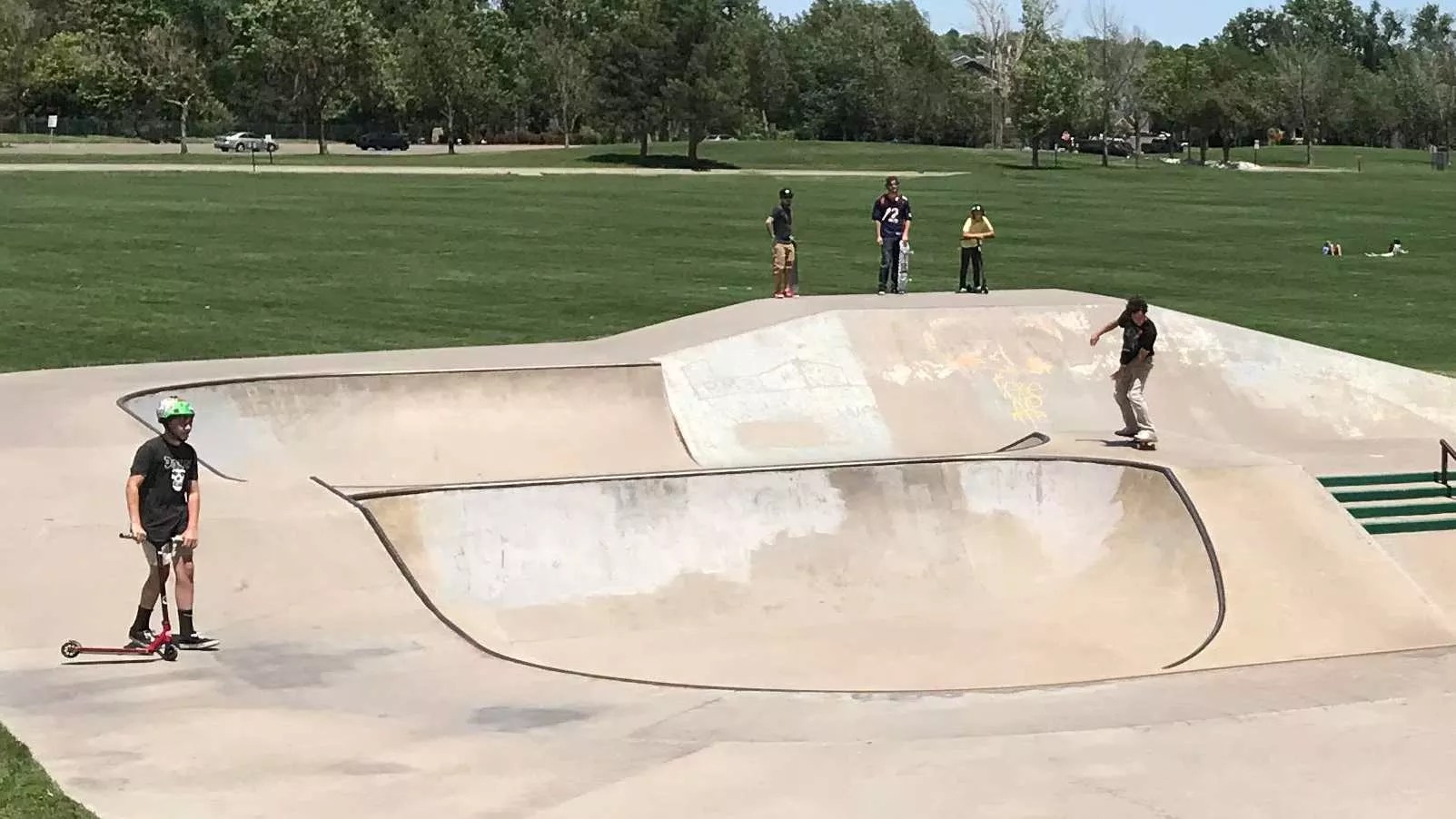
Photo by Michael Roberts

Audio By Carbonatix
On Sunday, June 7, months into the COVID-19 pandemic that’s shaken metro Denver (and the rest of the planet), twenty to thirty teens and tweens, most of them male, were taking advantage of the gorgeous weather at the Clement Park skate facility in Littleton, a short walk from Columbine High School – and not a single one wore a facial covering. Moreover, the skaters freely interacted without making any apparent concessions to the novel coronavirus, hanging out in closely packed groups totally free of social distancing.
What’s this called? Typical.
We first reported about a generation gap in attitudes toward mask-wearing more than two months ago, and the situation hasn’t changed over time, particularly in the case of males under age twenty. In fact, the dynamic has hardened, transitioning from trend to fact.
On April 3, Governor Jared Polis recommended that cloth masks be worn in public, based on advice from federal and local public-health officials, and he made young people’s use of them the theme of an entire press conference ten days later. But while Polis’s desire for the development of a “mask-wearing culture” in Colorado has been adopted by many adults across the state, particularly when grocery shopping, certain people remain more resistant to the practice than others – most prominently men of various ages.
Polis mentioned this phenomenon during a June 4 meeting with the media during which masks were again a prominent topic; he touted his issuance of an executive order allowing Colorado businesses to refuse service to those whose faces are uncovered. Polis noted that “studies show men are particularly resistant” to the use of masks, in part because they “think it makes them look weak.”
In his view, though, real weakness is prolonging the COVID-19 crisis because of a fear that they’ll look “uncool.”
Among the analyses touching on this subject is “Sex- and Gender-specific Observations and Implications for COVID-19,” by Lauren A. Walter and Alyson J. McGregor, working under the auspices of Middlesex University London and Berkeley, California’s Mathematical Science Research Institute. The study surveyed 2,459 U.S. residents, who shared their reactions to recommendations that they wear masks to prevent the spread of COVID-19.
The following excerpt summarizes some of the most telling results, which broke down along gender lines:
We find that men less than women intend to wear a face covering, but this difference almost disappears in counties where wearing a face covering is mandatory. We also find that men less than women believe that they will be seriously affected by the coronavirus, and this partly mediates gender differences in intentions to wear a face covering (this is particularly ironic because official statistics actually show that men are affected by the COVID-19 more seriously than women). Finally, we also find gender differences in self-reported negative emotions felt when wearing a face covering. Men more than women agree that wearing a face covering is shameful, not cool, a sign of weakness, and a stigma; and these gender differences also mediate gender differences in intentions to wear a face covering.

Some natural social distancing taking place on the Clement Park skate bowls on June 7, 2020.
Photo by Michael Roberts
To be sure, a modest percentage of male teenagers in the Denver area are open to wearing masks, particularly when they’re part of groups, as has been seen during downtown protests following the death of George Floyd.
But in the wild, as it were, teen boys appear to be the least likely demographic to don face coverings – and the personal danger to them is certainly low. According to the latest data from the Colorado Department of Public Health and Environment, updated at 4 p.m. June 8, the state has recorded just three deaths from COVID-19 among those between the ages of ten and nineteen, and among 1,300 positive cases in that age range, only 52 individuals have required hospitalization. But these figures don’t account for the number of people in vulnerable categories who may have been infected by younger Coloradans and suffered more serious, perhaps even fatal, outcomes.
Given the lack of social distancing at the protests and the more general opening of the state’s economy, future declines are likely. But don’t expect it to have an impact on most teenage boys in Colorado, the majority of whom seem to have concluded that masks are for old farts – and not for them.
Click to read “Sex- and Gender-specific Observations and Implications for COVID-19.”
A previous version of this post made note of a bump in hospitalizations originally reported by the Colorado Department of Public Health and Environment on June 8. The department subsequently retracted these figures and those currently in place show a decline.